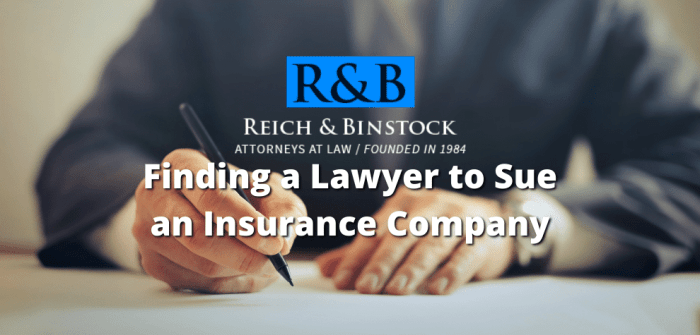
Can an insurance company sue you for an accident? It’s a question that might make you think twice about the aftermath of a fender bender or a slip and fall. While it might seem like a scenario straight out of a legal thriller, it’s a very real possibility. Insurance companies have a vested interest in protecting their bottom line, and they can take legal action if they believe you’ve acted in a way that violates your insurance policy or harms their financial interests.
Understanding the circumstances under which an insurance company might sue you is crucial for navigating the often-complicated world of insurance claims. This article will explore the legal basis for such lawsuits, the types of accidents that could trigger a lawsuit, and the factors that influence an insurance company’s decision to pursue legal action. We’ll also examine the potential consequences of a lawsuit and provide tips on how to prevent them from happening in the first place.
Insurance Company’s Right to Sue
You might think that after you pay your insurance premium, you’re in the clear, but think again. Insurance companies have the right to sue you, even after an accident, in certain situations.
It’s not always about you being a bad driver or breaking the law. Sometimes, it’s about the fine print in your insurance policy and the way the legal system works.
Insurance Contracts and Breaches
Insurance policies are legal contracts, and like any contract, they have terms and conditions. If you violate these terms, the insurance company might have the right to sue you. This is known as a breach of contract.
Here are some examples of how you might breach your insurance contract:
- Failing to disclose important information: When you apply for insurance, you’re required to provide accurate information about your driving history, your car, and other relevant details. If you lie or withhold information, the insurance company can sue you if you make a claim.
- Canceling your policy without proper notice: Most insurance policies have a cancellation period. If you cancel your policy before the end of the period, you might have to pay a penalty.
- Making a fraudulent claim: This is a big one! If you try to deceive the insurance company by exaggerating your injuries or the damage to your car, you could face legal action.
Subrogation Rights
Insurance companies have the right to “step into the shoes” of their insured person and pursue legal action against a third party who caused the accident. This is called subrogation.
For example, let’s say you get into an accident with another driver who was texting while driving. Your insurance company pays for your damages, but they then have the right to sue the other driver to recover the money they paid out.
Examples of When Insurance Companies Sue
Here are some scenarios where an insurance company might sue you:
- Fraudulent claims: As mentioned earlier, insurance companies take a dim view of fraud. They might sue you if you’re caught faking an accident or exaggerating your injuries.
- Intentional acts: If you intentionally cause an accident, your insurance company might refuse to cover your damages and even sue you.
- Breach of policy terms: If you fail to notify your insurance company about a change in your driving record, or if you don’t maintain your car properly, your insurance company might sue you if you make a claim.
Types of Accidents: Can An Insurance Company Sue You For An Accident

Insurance companies can sue you for accidents if they believe you are responsible for causing financial harm to them. This could happen if you’re found liable for an accident that resulted in a payout from the insurance company, and the company believes you were negligent or acted in a way that caused the accident.
Here’s a look at some common types of accidents that might lead to an insurance company taking legal action:
Car Accidents
Car accidents are a major area where insurance companies might sue you. Imagine you’re driving and cause an accident that injures another person or damages their car. If the other driver files a claim with their insurance company, and the insurance company pays out, they might seek to recover those costs from you.
Here are some specific scenarios where a lawsuit might arise:
- Hit-and-run accidents: If you leave the scene of an accident without providing your information or assisting the other driver, the insurance company may pursue legal action against you. This is because leaving the scene is a serious offense and can lead to significant legal consequences.
- Accidents involving uninsured drivers: If you’re involved in an accident with an uninsured driver, and the insurance company pays out on your behalf, they might seek reimbursement from you. This is because you are often held partially responsible for failing to have adequate insurance coverage.
- Accidents involving fraudulent claims: If you make a fraudulent insurance claim after an accident, the insurance company could sue you for fraud. This is a serious offense and can result in criminal charges, in addition to financial penalties.
Personal Injury Claims
Personal injury claims involve accidents where someone is injured due to another person’s negligence. This can happen in various situations, like a slip and fall at a store or a dog bite. If you’re found liable for causing the injury, the insurance company that paid out the claim might sue you to recover their losses.
Property Damage Claims
Similar to personal injury claims, property damage claims occur when someone’s property is damaged due to the negligence of another. This could involve a car accident that damages someone’s vehicle or a fire that damages a building. If you’re found responsible for the damage, the insurance company that paid out the claim might sue you to recover their losses.
Factors Influencing Suitability

Think of an insurance company as a business. They’re in the game to make money, not just to be the good guys. So, before they decide to take you to court, they weigh a bunch of factors to see if it’s worth their time and money.
Insurance Policy Terms
The insurance policy you signed is like a contract. It spells out the rules of the game, and it’s the first thing the insurance company checks. If you broke any of those rules, like driving without a license or being under the influence, it might give them a reason to sue.
Severity of the Accident
Did you just scratch a fender, or did you cause a multi-car pileup? The bigger the accident, the more likely the insurance company is to sue. This is because they’re on the hook for paying out big claims, and they want to make sure they get their money back.
Potential Financial Liability
The insurance company needs to make sure that suing you is worth the cost. If they think they can win a big settlement, they’re more likely to take you to court. But if they think the case is weak or the potential payout is small, they might decide to drop it.
Example
Imagine you’re driving your car and you get into a fender bender with a brand new Tesla. The other driver claims they have a back injury and wants a huge settlement. The insurance company will look at the damage to your car, the police report, and the other driver’s medical records. If they think the injury is real and the driver has a strong case, they might decide to sue you.
Legal Defenses Against Suits
You might be thinking, “Okay, so insurance companies can sue me? That’s wild!” But don’t worry, you’re not completely at their mercy. Just like in any legal battle, there are defenses you can use to fight back. We’ll break down some common ones, so you can feel more prepared.
Contributory Negligence
Imagine this: you’re driving down the road, minding your own business, and BAM! Some dude runs a red light and crashes into you. Seems pretty cut-and-dry, right? Well, not always. The insurance company might try to argue that you were also partially at fault, even if you didn’t break any laws.
Here’s where contributory negligence comes in. This defense basically says, “Yeah, the other guy was a jerk, but you could have done something to avoid the accident, too!” For example, if you were texting while driving and didn’t see the red light, the insurance company might claim you contributed to the accident.
Comparative Negligence, Can an insurance company sue you for an accident
Now, let’s say the other driver was definitely more at fault, but you were also a little bit careless. This is where comparative negligence comes into play. Instead of completely absolving the other driver, this defense assigns percentages of fault to each party.
Think of it like this: if the insurance company says you were 20% responsible for the accident, you might only be liable for 20% of the damages. It’s like a “blame game” where you’re both in the hot seat, but the judge or jury gets to decide who deserves the bigger slice of the pie.
Acts of God
Sometimes, accidents happen due to forces beyond anyone’s control. This is where the “Act of God” defense comes in. Think about a sudden, violent storm that causes a tree to fall on your car, or a freak earthquake that sends your house tumbling down.
If you can prove that the accident was caused by a natural disaster, it’s less likely that an insurance company will try to pin the blame on you. But remember, it’s not always easy to prove. You’ll need evidence to back up your claim, like official weather reports or geological data.
Other Defenses
Besides the big three, there are other legal defenses that might come in handy:
- Statute of Limitations: This is a time limit for filing a lawsuit. If the insurance company waits too long, they might lose their chance to sue you.
- Waiver: This means the insurance company gave up their right to sue you, either intentionally or unintentionally. For example, if they accepted a settlement from you without mentioning any further claims.
- Fraud: If the insurance company is trying to sue you based on false information or misleading evidence, you can use fraud as a defense.
Consequences of a Lawsuit
Being sued by an insurance company can be a stressful and daunting experience. It can have significant consequences that extend beyond the immediate legal proceedings, impacting your finances, credit score, and future insurance premiums.
Financial Implications
Being sued by an insurance company can result in substantial financial burdens. Here are some of the potential costs you may face:
- Legal Fees: Hiring an attorney to represent you in court can be expensive. Attorneys typically charge hourly rates, which can quickly add up.
- Court Costs: Court filing fees, service fees, and other administrative costs associated with the lawsuit can also be substantial.
- Potential Judgments: If the insurance company wins the lawsuit, you may be ordered to pay a significant judgment. This could include damages for the other party’s injuries, property damage, and even punitive damages in some cases.
Impact on Credit Score
A lawsuit filed against you can negatively impact your credit score.
- Public Records: Court records are often publicly available, and a lawsuit against you can become part of your public record. Lenders and other creditors may see this information and view it as a potential risk.
- Judgments: If a judgment is entered against you, it can be reported to credit bureaus and significantly lower your credit score.
Impact on Employment History
In some cases, a lawsuit filed against you could impact your employment history.
- Background Checks: Many employers conduct background checks as part of their hiring process. A lawsuit against you may show up on a background check and could make you less desirable to potential employers.
- Job Loss: Depending on the nature of the lawsuit and your profession, you could even face job loss if your employer believes the lawsuit negatively impacts their business.
Impact on Future Insurance Premiums
Being sued by an insurance company can significantly impact your future insurance premiums.
- Increased Premiums: Insurance companies may view you as a higher risk after a lawsuit, leading to increased premiums for auto, home, and other types of insurance.
- Difficulty Obtaining Coverage: Some insurance companies may be reluctant to offer you coverage altogether after a lawsuit, making it difficult to obtain insurance in the future.
Preventing Lawsuits

It’s no secret that insurance companies are known for their aggressive tactics when it comes to recouping losses. While they have the right to sue, it’s not a guarantee. You can take proactive steps to minimize the risk of facing a lawsuit. Think of it like a game of dodgeball, but instead of dodging balls, you’re dodging lawsuits.
Document Everything
Proper documentation is like having a cheat sheet in a game of dodgeball – it gives you the upper hand. After an accident, document everything, even the smallest details. Imagine it like this: If you were playing a game of dodgeball and you wanted to prove you were hit, you’d need evidence, right? Well, in the real world, that evidence is your documentation.
- Take pictures: Snap photos of the accident scene, including any damage to vehicles, injuries, and road conditions. This is like capturing a crucial moment in the game on camera – you have visual proof.
- Get witness information: If anyone saw the accident, gather their contact information. Think of them as your teammates, ready to back you up.
- Keep a detailed accident report: Include the date, time, location, weather conditions, and a description of the accident. It’s like keeping score in the game – it helps you remember what happened.
- Seek medical attention: Even if you think your injuries are minor, get checked out by a doctor. This is like having a coach in the game – it helps you avoid potential complications and provides documentation of your injuries.
Communicate with Your Insurance Company
Communication is key to avoiding lawsuits. Imagine you’re playing dodgeball and you’re trying to communicate with your teammates. You need to be clear and concise to ensure everyone is on the same page. The same applies to communicating with your insurance company.
- Be honest and transparent: Don’t try to hide information or downplay your role in the accident. This is like playing fair in the game – it builds trust and helps avoid unnecessary conflicts.
- Respond promptly to all inquiries: Don’t ignore phone calls or emails from your insurance company. Think of it like answering your coach’s calls during the game – it shows you’re engaged and responsible.
- Keep a record of all communications: This includes emails, phone calls, and letters. It’s like keeping track of your game stats – it helps you remember what was said and when.
Seek Legal Representation
Sometimes, even with proper documentation and communication, you may still face a lawsuit. That’s where legal representation comes in. Imagine having a skilled lawyer on your side during a game of dodgeball – they can strategize, provide advice, and protect your interests.
- Consult with an attorney: Even if you don’t think you need a lawyer, it’s a good idea to consult with one after an accident. They can help you understand your rights and obligations.
- Choose an attorney who specializes in insurance law: They’ll have the experience and knowledge to navigate the complexities of insurance litigation. It’s like choosing the right coach for your team – they have the expertise to guide you to victory.
- Don’t settle without legal advice: Insurance companies may try to pressure you into settling quickly. However, it’s important to get legal advice before making any decisions. Think of it like having a timeout in the game – it gives you time to strategize and make the best decision for your situation.
Final Review
In the end, knowing your rights and responsibilities as an insured individual is essential to protect yourself from potential lawsuits. By understanding the circumstances that could lead to legal action, you can take steps to minimize your risk and ensure that you’re prepared to handle any challenges that may arise. Remember, staying informed and proactive is the best defense against unexpected legal battles.
Answers to Common Questions
What happens if I’m found liable for an accident, but I don’t have enough insurance coverage?
If you’re found liable for an accident and don’t have enough insurance coverage, you could be held personally responsible for the damages. This means you could be sued for the remaining amount, potentially facing significant financial consequences.
Can an insurance company sue me for an accident that wasn’t my fault?
In some cases, yes. For example, if you fail to cooperate with the insurance company’s investigation or make false claims, they may take legal action even if you weren’t at fault for the accident itself.
What are the signs that an insurance company might sue me?
Some signs that an insurance company might sue you include: they’re demanding a large sum of money from you, they’re refusing to settle your claim, or they’re threatening to take legal action.
What should I do if an insurance company threatens to sue me?
If an insurance company threatens to sue you, it’s crucial to seek legal advice from an attorney specializing in insurance law. They can help you understand your rights and options and guide you through the legal process.




